
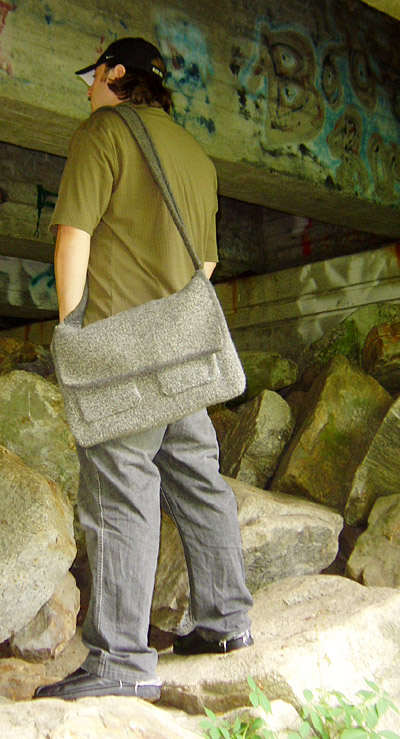  by
Stephanie Shiman by
Stephanie Shiman

As a child, when we traveled,
my father always carried a satchel. It was a handwoven
satchel from India, and the colors of the time: olive
green and gold. Dad's satchel was well traveled, keeping
safe the camera, wallet, passports, maps, etc. I'm
not sure what happened to his bag -- it has been replaced
by many more now -- but lives on in our family vacation
photos.
Inspired by his travel satchel,
this modern messenger bag is knit on large needles
with double-stranded wool, and then felted. The entire
bag is knit in stockinette stitch, mostly in the round,
and is seamless. Small gussets give dimension and
the I-cord detailing adds a finished look. I rated
the difficulty as tangy, but really anyone can knit
it. All your mistakes will be felted away.
|
|
 model: Stephen
Broyles (Dad) & Konstantine Shiman
model: Stephen
Broyles (Dad) & Konstantine Shiman  photos: Stephanie
Shiman
photos: Stephanie
Shiman
|
|
|
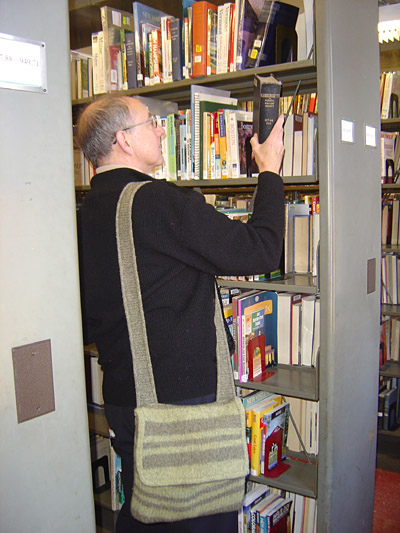 Sized
to fit a manuscript book & papers, or a small
notebook computer Sized
to fit a manuscript book & papers, or a small
notebook computer
Before felting
Height: 17 inches
Width: 16 inches
Strap Length: 65 inches
After felting:
Height: 12 inches
Width: 13.5 inches
Strap Length: 52 inches
Cascade 220 [100% Peruvian Wool; 220 yd/198m per 100g
skein]
 [MC] Color: #4011; 3 skeins
[MC] Color: #4011; 3 skeins
 [CC] Color: #9460; 2 skeins
[CC] Color: #9460; 2 skeins
 1 set US 13/9mm double-point needles
1 set US 13/9mm double-point needles
 1 24-inch US 13/9mm circular needle
1 24-inch US 13/9mm circular needle
 Tapestry needle
Tapestry needle
 Stitch marker
Stitch marker
 Stitch holder
Stitch holder
|
| |
Approx. 10 sts/14 rows
= 4 inches in stockinette stitch with double strand
of yarn
(exact gauge is not important) |
|
|
|
[Knitty's list of standard abbreviations
can be found here]
I-Cord
BO
With RS of work facing
and using cable or twisted loop method, CO 3 sts.
(Cast these new sts on in addition to sts already
on needle.)
Next Row: Using a
double-pointed needle, k2, ssk. (Last I-Cord st has
been worked together with first picked-up st on needle.)
Slide 3 sts just worked to other end of a double-pointed
needle and bring yarn around back of work, ready to
begin working the next row.
Repeat this row for each
st to be bound off, working next st from circular
needle tog with last st on double-pointed needle for
each ssk.
|
Note:
Knit with two strands of yarn held together
throughout.
Using
circular needle and MC, loosely CO 38 sts.
Beg with a RS row,
work 7 rows in stockinette st.
At end of last row,
do not turn work but pick up and k 6 sts down
adjacent edge of work, pick up and k 38 sts
along CO edge, pick up and k 6 sts along rem
edge of work. 88 sts on needle. Place marker
and beg working in stockinette st in the round,
working stripe patt as follows:
7 rows MC
7 rows CC
3 rows MC
3 rows CC
3 rows MC
7 rows CC
7 rows MC
3 rows CC
3 rows MC
3 rows CC
7 rows MC
7 rows CC
Next Round: Using
CC, k38 sts with CC, BO rem sts using I-Cord BO.
At end of round, place I-Cord sts on st holder.
Flap
Working back and forth in
stockinette st on 38 rem sts, work stripe patt as
follows:
2 rows MC
7 rows CC
7 rows MC
3 rows CC
3 rows MC
3 rows CC
7 rows MC
7 rows CC
Break yarn at end of last
row. Place all sts on hold on double-pointed
needles.
With WS facing, using CC and circular needle,
beg at corner where flap attaches to bag (lower
right corner when WS facing), pick up and
p 30 sts along edge of flap (pick up 3 sts
for every 4 rows), p held sts from double-pointed
needles, pick up and p 30 sts down rem edge
of flap, ending next to held sts from I-Cord
BO. 98 sts on needle.
With RS facing, rejoin CC to held I-Cord sts
and BO all sts around flap using I-Cord BO.
When all sts have been bound off, sew end
of I-Cord to CO end of I-Cord.
Strap
Using MC, CO 10 sts.
Work in stockinette st until
work measures 65 inches.
BO all sts.
Pocket
Using MC, CO 24 sts.
Work in stockinette st, working
stripe patt as follows
2 rows MC
3 rows CC
3 rows MC
7 rows CC
7 rows MC
Using CC, BO using I-Cord
BO. BO I-Cord sts.
(You can make as many pockets
as you have yarn for! Choose the spot on the bag
where you'd like your pocket to go, count the stripes
and knit accordingly.)
|
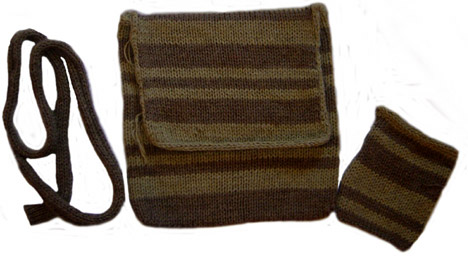 before felting
before felting |
|
Secure the ends or weave them
in. I just tied little knots to secure the yarn at
the color changes, you can easily cut all these pieces
off once the bag is felted and it won't unravel. Place
satchel, strap and pocket in a tied (a rubber band
works well) pillow case and put into a washing machine
full of hot, soapy water. Agitate in the wash cycle
until bag is felted to desired size and density. Watch
carefully! The shrinking might be sudden -- check
every couple of minutes to be safe.
Once your bag is felted,
take it out and rinse it if necessary. Be sure to
use hot water, the shock of cold water will cause
it to shrink more. Roll it in a towel and squeeze
out the excess water. Shape it by pulling and tugging,
cut off all the yarn tails.
Rinse the pocket and strap.
Let the pocket dry flat. You might want to run the
strap through another wash cycle; the more felted
it is, the less it will stretch. To ensure that my
strap didn't curl, I rolled it tightly into a coil.
Roll with the WS facing out. Fasten the coil with
a rubber band and leave it to dry.
Stuff your bag to ensure
that it will have the shape you desire when it dries.
A box, towels or almost any rectangular thing of the
appropriate size will work. I used a large phone book
(tied in a plastic bag) to shape my bag. Place your
bag on towels to dry, change the towels when they
get too wet. Allow the bag a day or two to dry completely.
After your bag is dry, you
are ready to sew on the pocket(s) and strap. All of
the sewing can be done with matching or contrasting
yarn, depending on the look you want. Take some sharp
scissors and trim the edges of the pocket (but not
the I-Cord edge) to make them nice and straight. Cut
the strap to about 4 inches longer than the desired
length. Place the ends of the strap about 2 inches
below the top of the bag, right where the back becomes
the flap -- this will keep the bag from tipping forward.
Sew it on very securely with small, tight stitches,
forming a 2-inch square. (See illustrations/photos.)
Position pockets as desired
and sew then on using small, tight stitches, near
the edges of the pocket.
Head out for adventure.
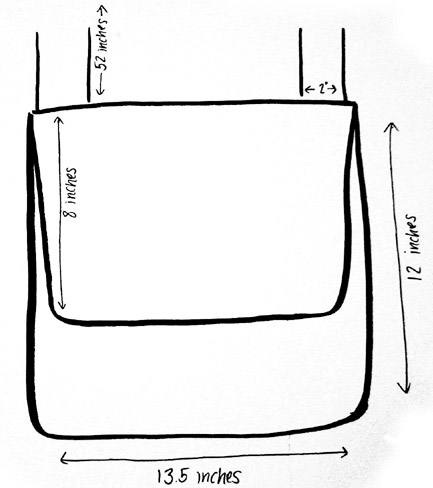
|
|
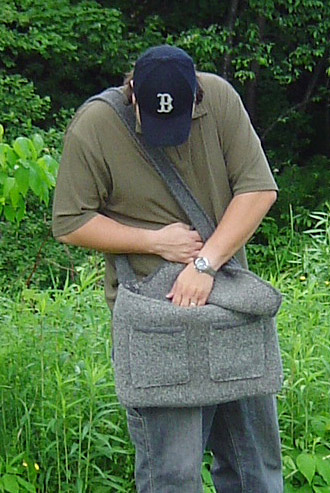 Fits
a larger laptop computer; sized for use as school
bag or carry-on luggage Fits
a larger laptop computer; sized for use as school
bag or carry-on luggage
Before felting
Height:
19 inches
Width: 22 inches
Strap Length: 65 inches
After felting:
Height: 13 inches
Width: 17 inches
Strap Length: 52 inches
Gusset Depth: 2.5 inches
Cascade 220 [100% Peruvian Wool; 220 yd/198m per 100g
skein]
 [MC] Color: #9402;
6 skeins
[MC] Color: #9402;
6 skeins
 [CC] Color: #8400;
2 skeins
[CC] Color: #8400;
2 skeins
 1 set US 13/9mm double-point needles
1 set US 13/9mm double-point needles
 1 24-inch US 13/9mm circular needle
1 24-inch US 13/9mm circular needle
 Tapestry needle
Tapestry needle
 Stitch marker
Stitch marker
 Stitch holder
Stitch holder
|
| |
Approx. 10 sts/14 rows
= 4 inches in stockinette stitch with double strand
of yarn
(exact gauge is not important) |
Using circular
needle and MC, loosely CO 52 sts.
Beg
with a RS row, work 13 rows in stockinette st.
At end
of last row, do not turn work but pick up
and k 12 sts down adjacent edge of work, pick
up and k 52 sts along CO edge, pick up and
k 12 sts along rem edge of work. 128 sts on
needle. Place marker and beg working in stockinette
st in the round.Cont
until work measures 18 inches from edge of
base.
Next
Round: Using
MC k52, using CC BO rem sts using I-Cord BO.
At end of round, place I-Cord sts on st holder.
Flap
Using MC, Work
back and forth in stockinette st on 52 rem
sts for 52 rows.
Break yarn at
end of last row. Place all sts on hold on
double-pointed needles.
With WS facing,
using CC and circular needle, beg at corner
where flap attaches to bag (lower right corner
when WS facing), pick up and p 39 sts along
edge of flap (pick up 3 sts for every 4 rows),
p held sts from double-pointed needles, pick
up and p 39 sts down rem edge of flap, ending
next to held sts from I-Cord BO. 130 sts on
needle.
With
RS facing, rejoin CC to held I-Cord sts and
BO all sts around flap using I-Cord BO. When
all sts have been bound off, sew end of I-Cord
to CO end of I-Cord.
Strap
Using
MC, CO 12 sts.
Work
in stockinette st until work measures 65 inches.
BO
all sts.
Pockets
(Make 2):
Using
MC, CO 22 sts.
Work
30 rows in stockinette st.
Using
CC, BO using I-Cord BO. BO I-Cord sts.
|
|
See directions for smaller bag.
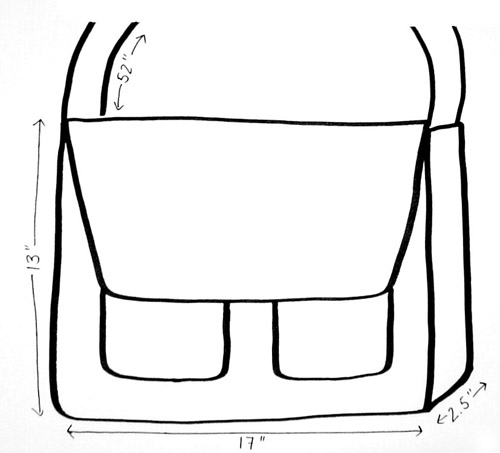
|
|
  Right
about now, Stephanie and family are unpacking
in their home in Marlboro, Vermont, where they
hope they'll like it enough to stay forever. Right
about now, Stephanie and family are unpacking
in their home in Marlboro, Vermont, where they
hope they'll like it enough to stay forever.
When she's not busy chasing four-year-old
daughter Adaylia; Stephanie spends her time
knitting, spinning, sewing and dabbling in other
fiber-related activities.
Stephanie's newest fiber adventure is importing
a plethora of recycled silk yarn from Nepal;
you can read more about that at her
website.
|
| Pattern &
images © 2005 Stephanie Shiman. Contact Stephanie> |
|

